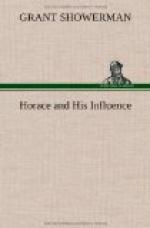the rule against the mingling of the tragic and comic
“kinds”; the rule against the artificial
denouement? Who has not heard of French playwrights
composing “with one eye on the clock” for
fear of violating the unity of time, or of their delight
in the writing of drama as in “a difficult game
well played?” If Alexandrian criticism, and,
back of it, Aristotle, were ultimately responsible
for the rules, Horace was their disseminator in later
times, and was looked up to as final authority.
Who has not heard and read repeatedly the now common-place
injunctions to be appropriate and consistent in character-drawing;
to avoid, on the one hand, clearness at the cost of
diffuseness, and, on the other, brevity at the cost
of obscurity; to choose subject-matter suited to one’s
powers; to respect the authority of the masterpiece
and to con by night and by day the great Greek exemplars;
to feel the emotion one wishes to rouse; to stamp
the universal with the mark of individual genius; to
be straightforward and rapid and omit the unessential;
to be truthful to life; to keep the improbable and
the horrible behind the scenes; to be appropriate
in meter and diction; to keep clear of the fallacy
of poetic madness; to look for the real sources of
successful writing in sanity, depth of knowledge,
and experience with men; to remember the mutual indispensability
of genius and cultivation; to combine the pleasant
and the useful; to deny one’s self the indulgence
of mediocrity; never to compose unless under inspiration;
to give heed to solid critical counsel; to lock up
one’s manuscript for nine years before giving
it to the world; to destroy what does not measure
up to the ideal; to take ever-lasting pains; to beware
of the compliments of good-natured friends? Not
less familiar are the apt figurative illustrations
of the woman beautiful above and an ugly fish below,
the purple patch, the painter who would forever put
in his cypress tree, the amphora that came out a pitcher,
the dolphin in the wood and the boar in the waters,
the sesquipedalian word, the mountains in travail
and the birth of the ridiculous mouse, the plunge
in medias res, the praiser of the good old
times, the exclusion of sane poets from Helicon, the
counsellor who himself can write nothing, but will
serve as whetstone for genius, the nodding of Homer.
Nor did the effects of this diffusion of Horatian precept consist merely in restraint upon the youthful and the impulsive, or confine themselves to the drama, with which the Ars Poetica was mainly concerned. The persuasive and authoritative counsels of the Roman poet have entered, so to speak, into the circulatory system of literary effort and become part of the life-blood of modern enlightenment. Their great effect has been formative: the cultivation of character in literature.
2. HORACE AND LITERARY CREATION
i. THE TRANSLATOR’S IDEAL




